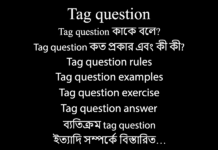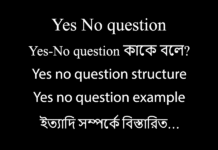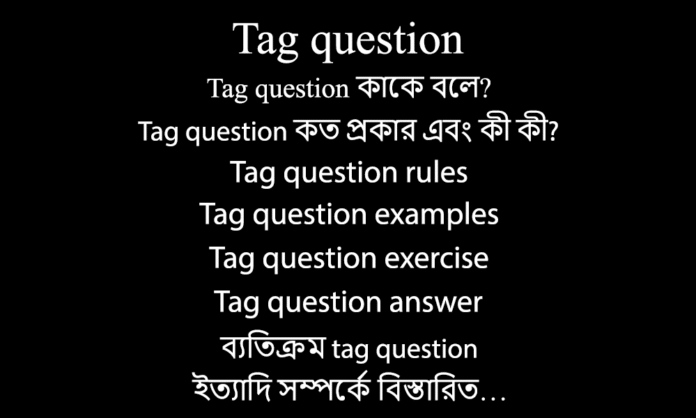Tag question কাকে বলে?
যে সকল বাক্যের শেষাংশে সমর্থন সূচক প্রশ্ন সংযোগ করা হয় তাকে Tag question বা জুড়ন প্রশ্ন বলে। Tag question শব্দের অর্থ হচ্ছে প্রশ্ন জুড়ে দেওয়া আর এর অপর নাম হলো mini question।
Tag question কত প্রকার এবং কী কী?
Tag question দুই প্রকার।
i. Affirmative tag question
ii. Negative tag question
Tag question গঠনের নিয়ম এবং tag question example
1. প্রথমে মূল Sentence টি অপরিবর্তিত অবস্থায় বসবে + Comma(,) + Tag question + ? বসবে।
2. Tag question করার সময় প্রদত্ত Sentence টি Affirmative হলে সেক্ষেত্রে Negative tag হবে আবার যদি Sentence টি Negative হয় তাহলে Affirmative tag হবে।
3. Tag question এর কর্তা সবসময় Pronoun হয়।
Example:
i. He is a teacher, isn’t he?
ii. He is not a teacher, is he?
Negative tag question করার ক্ষেত্রে Verb সমূহের Short form
am not = aren’t / ain’t
is not = isn’t
are not = aren’t
was not = wasn’t
were not = weren’t
have not = haven’t
has not = hasn’t
had not = hadn’t
do not = don’t
does not = doesn’t
did not = didn’t
shall not = shan’t
will not = won’t
can not = can’t
could not = couldn’t
should not = shouldn’t
would not = wouldn’t
may not = mayn’t
must not = mustn’t
might not = mightn’t
dare not = daren’t
ought not = oughtn’t
need not = needn’t
Note: am not এবং are not উভয় ক্ষেত্রে short form হিসেবে aren’t ব্যবহারই যুক্তিযুক্ত।
এখন আমরা tag question rules এবং ব্যতিক্রম tag question এবং সাথে tag question examples সহ জানব।
Tag question rules
1. সাহায্যকারী Verb যুক্ত Sentence কে Tag question করতে হলে প্রদত্ত sentence এর সাহায্যকারী Verb যুক্ত হয়। আর আমরা আগেই জেনেছি Affirmative sentence এর ক্ষেত্রে Negative tag এবং Negative sentence এর ক্ষেত্রে Affirmative tag বসে। এবং কর্তা সবসময় Pronoun হয়।
I am a student, aren’t I?
Ali has bought a phone, hasn’t he?
We can do the work, can’t we?
Nargis can’t swim, can she?
They should learn English, shouldn’t they?
2. যদি কোনো sentence এ সাহায্যকারী verb না থাকে শুধু মূল verb থাকে, তখন tag question গঠনে don’t / doesn’t, didn’t ব্যবহার করতে হয়। Present indefinite tense এর ক্ষেত্রে don’t / doesn’t এবং Past indefinite tense এর ক্ষেত্রে didn’t হবে।
They play football, don’t they?
Ali lives in Dhaka, doesn’t he?
I ate rice, didn’t I?
You don’t go there, do you?
He bought a computer, didn’t he?
Ali doesn’t like this job, does he?
3. সাহায্যকারী Verb যুক্ত exclamatory sentence এর ক্ষেত্রে প্রদত্ত sentence এর সাহায্যকারী Verb গুলো পূর্বের মতোই বসবে এবং subject noun এর পরিবর্তে pronoun টি বসবে।
How handsome the boy is, isn’t he?
What a lovely place it is, isn’t it?
How talkative he was, wasn’t he?
Hurrah! We have won the game, haven’t we?
4. মূল Verb যুক্ত exclamatory sentence এর ক্ষেত্রে tense অনুযায়ী don’t / doesn’t, didn’t ব্যবহার করতে হয়।
How nicely Ali sings, doesn’t he?
How beautiful the girl looks, doesn’t she?
Oh! I lost my wallet, didn’t I?
5. যদি exclamatory sentence এ subject ও verb না থাকে তাহলে প্রদত্ত Sentence টি বুঝে subject ও verb ধরে নিয়ে Tag গঠন করতে হয়। কিন্তু বেশির ভাগ ক্ষেত্রেই tag করতে হবে isn’t it ব্যবহার করে।
How funny, isn’t it?
How nice, isn’t it?
What a pity, isn’t it?
6. Imperative sentence এর ক্ষেত্রে order বা advice বুঝালে tag question করতে হয় will you / won’t you ব্যবহার করে। আবার যদি কোনো কিছু করতে অনুরোধ করা হয় তখন অর্থ অনুসারে অর্থাৎ ভাবার্থ অনুযায়ী will / would / can / could / can’t বসাতে পারি।
Be honest, won’t you?
Close the door please, will you?
Give me a phone, can you?
7. Imperative sentence যদি Let us অর্থাৎ Let’s দিয়ে শুরু হয় তাহলে tag question করার সময় shall we ব্যবহার করতে হয়।
Let us go there, shall we?
Let’s go out for a walk, shall we?
Let’s be honest, shall we?
8. আবার Imperative sentence এ যদি Let এর পরে me, him, her, them, Ali ইত্যাদি থাকে তাহলে tag question করতে হয় will you ব্যবহার করে।
Let them play football, will you?
Let Ali do the work, will you?
Let me learn English, will you?
9. যদি Don’t দিয়ে sentence শুরু হয় তাহলে tag question করতে হবে will you ব্যবহার করে।
Don’t tell a lie, will you?
Don’t be dishonest, will you?
Don’t forget me, will you?
10. Complex sentence এর ক্ষেত্রে main/principal clause এর subject অনুযায়ী tag question করতে হয়।
Note: যদি দুই বাক্যের মাঝখানে Joining word থাকে তাহলে প্রথম বাক্যটির tag question করতে হবে। কিন্তু প্রথম বাক্যের শুরুতে যদি Joining word থাকে তাহলে ২য় বাক্যটির tag question করতে হবে।
We like him because he is honest, don’t we?
If you do the work, you will earn money, won’t you?
I am sure that Ali will come today, aren’t I?
11. যদি Need মূল verb হিসেবে ব্যবহৃত হয় এবং বাক্যটি present indefinite tense হয় তাহলে don’t / doesn’t ব্যবহার করতে হবে। আবার, Need যদি modal auxiliary verb হিসেবে ব্যবহৃত হয় তাহলে tag question করতে হবে needn’t ব্যবহার করে।
I need a phone, don’t I?
He needs a computer, doesn’t he?
I need to do the work, don’t I?
I need do the work, needn’t I?
I need fulfill my dream, needn’t I?
12. কোন Sentence এর Subject যদি everybody / somebody / anybody / everyone / someone / anyone / nobody / no one / none ইত্যাদি হয় তাহলে এদের পরিবর্তে tag question এর subject টি they হবে।
Everyone goes to the office, don’t they?
Every mother loves her child, don’t they?
Every student is going to school, aren’t they?
Nobody loves the dishonest, do they?
No one likes a liar, do they?
13. কোন Sentence এর Subject যদি everything / anything / something / nothing ইত্যাদি হয় তাহলে এদের পরিবর্তে tag question এর subject টি it হবে।
Everything is possible, isn’t it?
Nothing looks bad here, does it?
Nothing is impossible for me, is it?
14. There যুক্ত sentence এর ক্ষেত্রে tag question করতে হয় there কে subject হিসেবে ব্যবহার করে।
There is a phone on the table, isn’t there?
There is something wrong with Ali, isn’t there?
There are a lot of students, aren’t there?
15. কোন Sentence এর Subject যদি all of us / everyone of us / most of us / many of us / some of us / one of us / none of us ইত্যাদি হয় তাহলে এদের পরিবর্তে tag question এর subject টি we হবে।
All of us organized the party, didn’t we?
Most of us can do the work, can’t we?
যদি all of us এর পরিবর্তে all of you হয় অর্থাৎ us এর পরিবর্তে you থাকলে tag question এর subject টি you হবে।
All of you should do the work, shouldn’t you?
Many of you can earn money, can’t you?
আবার যদি all of us এর পরিবর্তে all of them হয় অর্থাৎ us এর পরিবর্তে them থাকলে tag question এর subject টি they হবে।
Most of them will go to the office, won’t they?
All of them aren’t students, are they?
16. We ব্যতীত কোনো sentence এর subject যদি plural হয় তাহলে tag question করতে হবে they ব্যবহার করে।
Birds can fly, can’t they?
Fishes can swim, can’t they?
Students weren’t ready to go there, were they?
17. কোনো মূল sentence এর subject ও auxiliary verb সংক্ষিপ্ত আকারে থাকলে, প্রথমে সংক্ষিপ্ত আকারের সঠিক রূপটি নিশ্চিত করতে হবে তারপর tag question করতে হবে।
They’re going to college, aren’t they?
He’d go there, wouldn’t he?
He’d gone there, hadn’t he?
18. যে সকল sentence এর মধ্যে never, hardly, rarely, scarcely, seldom, few, little, barely, neither, nobody, nothing, none ইত্যাদি অর্থাৎ Negative শব্দ থাকলে tag question সবসময় ‘হ্যাঁ’ বোধক হবে।
He has few books, has he?
There is no money in my pocket, is there?
He never tells a lie, does he?
I know little about it, do I?
Ali hardly speaks the truth, does he?
আবার কিন্তু a few, a little থাকলে tag question ‘না’ বোধক হবে।
I have a few friends, don’t I?
He is a little boy, isn’t he?
19. কোনো sentence এ As well as, along with, together with, accompanied by, in addition to, including with, and not, surrounded by ইত্যাদি দ্বারা দুটি subject যুক্ত হলে প্রথম subject অনুযায়ী tag question করতে হবে।
Ali as well as his sister came here, didn’t he?
He along with me has read the book, hasn’t he?
20. Not only……but also, not…..but, either…..or, neither…..nor এবং or দ্বারা দুটি subject যুক্ত হলে দ্বিতীয় subject অনুযায়ী tag question করতে হবে।
Not only Nargis but also Ali is intelligent, isn’t he?
Neither Ali nor his friends did the work, did they?
21. কোনো বাক্যের শুরুতে Adjective এর আগে the বসলে tag question এর subject হিসেবে they বসবে।
The poor lead a miserable life, don’t they?
The rich don’t always lead a happy life, do they?
The poor are not always happy, are they?
22. কোনো sentence এর Subject বস্তু, স্থান, পশু-পাখি অর্থাৎ ব্যক্তিবিহীন হলে tag question এর subject হিসেবে it বসবে। কিন্তু subject টি plural হলে they হবে।
The phone is mine, isn’t it?
The sun gives us light, doesn’t it?
The cow is a useful animal, isn’t it?
Fishes can not fly, can they?
23. Common gender ‘Man’ যখন Singular noun হিসেবে ব্যবহৃত হবে তখন tag question এর subject টি he হবে এবং A man / The man এরূপ ক্ষেত্রেও he হবে।
Man is mortal, isn’t he?
The man is not poor, is he?
24. কোনো sentence এর subject হিসেবে this বা that থাকলে tag question এর subject টি it হবে। আর যদি these বা those হয় তাহলে they হবে।
This is not an English book, is it?
That is my computer, isn’t it?
These books are mine, aren’t they?
Those lands were ours, weren’t they?
25. I, we, you এই সকল pronoun গুলো Proper noun হিসেবে sentence এর subject হলে tag question এর subject টি it হবে।
‘I’ is a pronoun, isn’t it?
‘You’ is a pronoun, isn’t it?
26. কোনো sentence এ দেশের নাম subject হিসেবে ব্যবহৃত হলে tag question এর subject টি she হবে। তবে it বসালেও হবে।
Bangladesh is a small country, isn’t she?
Bangladesh has a Bengali Muslim majority, hasn’t she?
27. Abstract noun দ্বারা যুক্ত sentence কে tag question করতে হয় it ব্যবহার করে।
The mother rose in her, didn’t it?
Honesty is the best policy, isn’t it?
Health is wealth, isn’t it?
Kindness is a great virtue, isn’t it?
28. কোনো sentence এ subject হিসেবে One থাকলে tag question করতে হয় he ব্যবহার করে।
One can not do the work, can he?
One should do one’s duty, shouldn’t he?
One can do it, can’t he?
29. Wish করা বোঝালে অর্থাৎ Good morning, Thank you, Happy birthday থাকলে, সাধারণত এগুলোর tag question হয় না তবুও যদি কোনো বইয়ে বা প্রশ্নে থাকে তাহলে এর সঠিক উত্তর don’t I হবে।
Good morning, don’t I?
Thank you, don’t I?
Happy birthday, don’t I?
30. কোনো sentence এ subject হিসেবে Allah, God, Creator থাকলে tag question এর subject টি He হবে এবং Capital letter দিয়ে লিখতে হবে।
Allah won’t excuse a sinner, will He?
Allah is one, isn’t He?
ব্যতিক্রম tag question
I have to do the work, don’t I?
I don’t have to do the work, do I?
Ali has to go there, doesn’t he?
Ali doesn’t have to go there, does he?
He had to go to the office, didn’t he?
He didn’t have to go to the office, did he?
Note: আমরা জানি have, has, had মূল verb হিসেবে sentence এ ব্যবহৃত হলে tag question করার সময় sentence টি Affirmative হলে don’t / doesn’t / didn’t এবং sentence টি Negative হলে do / does/ did হয়। এখানে have to, has to, had to থাকার কারনে have, has, had মূল verb হিসেবে ব্যবহৃত হয়েছে।
আবার যদি sentence এ “am to, is to, are to” এবং এদের Negative form “am not to, is not to, are not to” অর্থাৎ am, is, are মূল verb হিসেবে sentence এ ব্যবহৃত হয় তাহলে tag question করতে হবে Affirmative এর ক্ষেত্রে isn’t / aren’t এবং Negative এর ক্ষেত্রে am / is / are ব্যবহার করে।
Ali is to do the work, isn’t he?
He is not to do the work, is he?
Tag question exercise
i. A student should read the texts again and again, ………….?
ii. Time and tide wait for none, ………..?
iii. Rivers run fast, ………….?
iv. Dirty water is not good, ………….?
v. There is a little water in this pond, ………..?
vi. Ali and Nargis will go to Dhaka, …………?
vii. He has to lead a miserable life, ………..?
viii. One lie begets hundred lies, ………..?
ix. Please, don’t waste your time, …………?
x. I have to work hard for whatever I want to be. Because success in life depends on hard work, …………?
Note: Full Stop (.) দিয়ে একাধিক sentence একসাথে যুক্ত থাকলে (অর্থ বুঝে) শেষের sentence টি থেকে tag question এর উত্তর করতে হবে।
Tag question answers: (i). shouldn’t he (ii). do they (iii). don’t they (iv). is it (v). isn’t there (vi). won’t they (vii). doesn’t he (viii). doesn’t it (ix). will you (x). doesn’t it
Tag question answer
কথপোকথনের সময় tag question এর উত্তর দেওয়া যতটা সহজ মনে হয় ততটাও সহজ নয়। বুঝলে আবার সহজ। কিভাবে সহজেই tag question এর উত্তর দিতে পারেন তা নিয়েই নিচে উদাহরণের মাধ্যমে বিস্তারিত আলোচনা করা হলো।
1. Coal is black, isn’t it? (কয়লা কালো, তাই না?)
= Yes, it is.
2. Coal isn’t black, is it? (কয়লা কালো নয়, তাই না?)
= Yes, it is!
3. Coal is white, isn’t it? (কয়লা সাদা, তাই না?)
= No, it isn’t!
4. Coal isn’t white, is it? (কয়লা সাদা নয়, তাই না?)
= No, it isn’t.
উপরের সকল উত্তরগুলোই সঠিক। বিভ্রান্তিতে পড়ে গেলেন। সমস্যা নেই আমরা একটা একটা করে বিস্তারিত জানব তাহলে সকল বিভ্রান্তি চলে যাবে।
নাম্বার 1: Coal is black, isn’t it? (কয়লা কালো, তাই না?) আমরা সকলেই জানি কয়লা কালো এজন্য উত্তরে বলতে পারি, Yes, it is black. (হ্যাঁ, এটা কালো।) এখানে
(it is black এই বাক্যকে সংক্ষেপে বলার জন্য it is বলা হয়।) সুতরাং সঠিক উত্তর হলো Yes, it is.
নাম্বার 2: Coal isn’t black, is it? (কয়লা কালো নয়, তাই না?) এখানে আমরা যদি উত্তরে No বলি তাহলে উত্তর ভুল। মনে রাখার বিষয় উত্তরে No বললে বাকি উত্তরটুকু Negative হবে। আবার উত্তরে Yes বললে বাকি উত্তরটুকু Positive হবে। এটাই মেইন শর্ত। এই শর্ত বুঝলে সহজেই উত্তর দিতে পারব। সুতরাং উত্তরে যদি No বলি তাহলে পুরো উত্তরটুকু হবে No, it isn’t! মানে {No, it isn’t black. (না, এটা কালো নয়।)} কয়লা যেহেতু কালো সুতরাং এটা ভুল উত্তর। সঠিক উত্তর হলো Yes, it is. মানে {Yes, it is black. (হ্যাঁ, এটা কালো।)}
নাম্বার 3: Coal is white, isn’t it? (কয়লা সাদা, তাই না?) কয়লা যেহেতু সাদা নয় সুতরাং আমরা সহজেই এর উত্তর বলতে পারি, No, it isn’t. মানে {No, it isn’t white. (না, এটা সাদা নয়।)}
নাম্বার 4: Coal isn’t white, is it? (কয়লা সাদা নয়, তাই না?) এখানে আমরা উত্তরে যদি Yes বলি তাহলে উত্তর ভুল। কারণ Yes বললে বাকি উত্তরটুকু positive হবে। সুতরাং Yes, it is! মানে {Yes, it is white. (হ্যাঁ, এটা সাদা।) কয়লা যেহেতু সাদা নয় সুতরাং উত্তর ভুল} সঠিক উত্তর হলো No, it isn’t. মানে {No, it isn’t white. (না, এটা সাদা নয়।)} আশা করি বুঝতে পেরেছেন।
Note: “Tag question” affirmative নাকি negative সেটা দেখার বিষয় নয়। প্রথমে ভালো ভাবে অর্থ বুঝতে হবে তারপর উত্তর দিতে হবে। উত্তরে Yes বললে বাকিটুকু positive উত্তর হবে। আর উত্তরে No বললে বাকিটুকু negative উত্তর হবে। আর শুধুমাত্র Yes / No না বলে যেন প্রশ্নদাতা সহজেই উত্তর বুঝতে পারে সেভাবেই উত্তর দিতে হবে। আশা করি, এখন থেকে tag question answer দিতে পারব।









